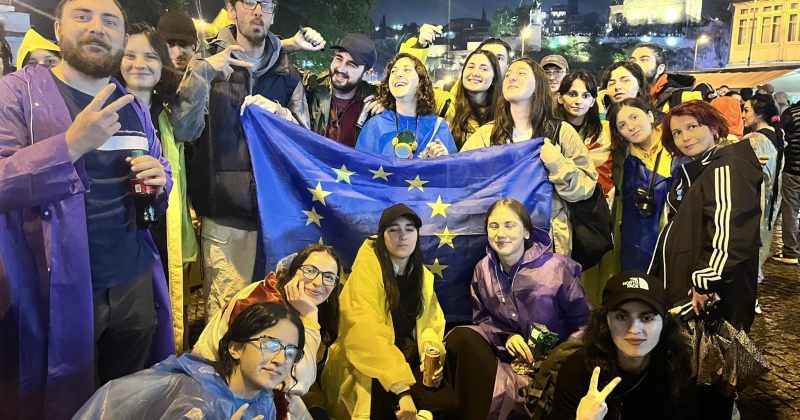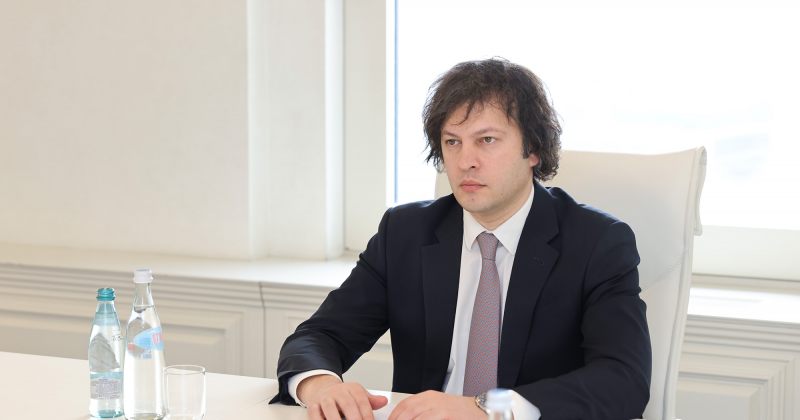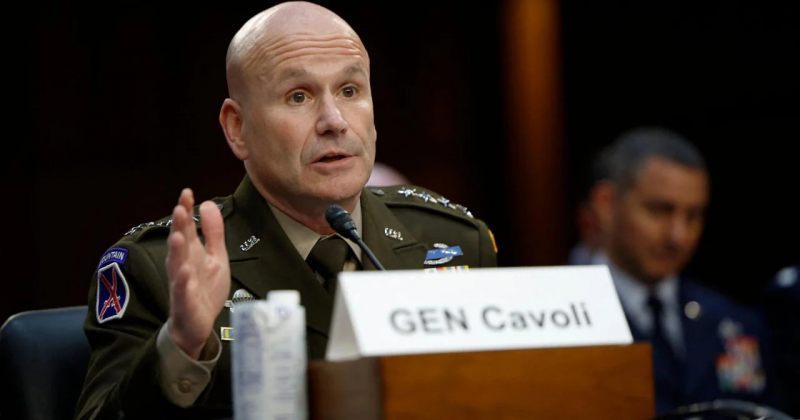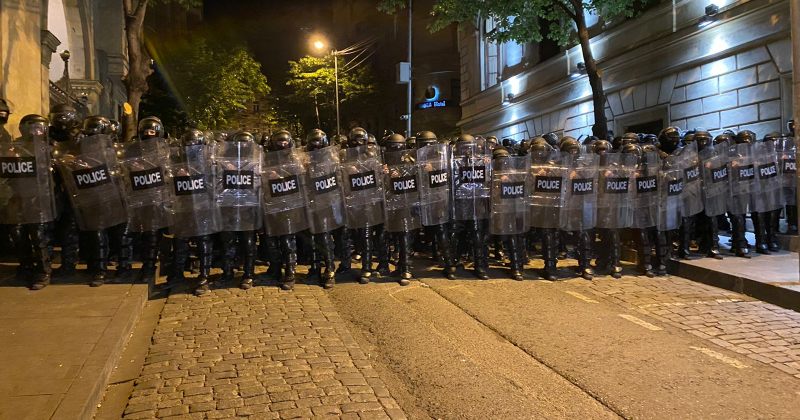Several years ago, the New Rights Party united in the Alliance For Georgia along with Bidzina Ivanishvili’s current allies – the Republican Party and Irakli Alasania’s Our Georgia-Free Democrats. Today, the New Rights Party stands outside hot political processes. Tabula interviewed New Rights leader Davit Gamkrelidze about the party’s plans for the upcoming election, the existing political situation, attitudes in the society, past political mistakes and other topical issues.
- The year 2012 is a year of parliamentary elections. You do not plan to unite with other political parties in a political bloc or an alliance. Please tell us about your election campaign plans. How are you gearing up for the elections?
The year 2012 is an important year. The upcoming election is a decisive stage for the Georgian democracy and state. If we pass the test on democracy by conducting the election in a fair environment, it will herald a new stage in the Georgian statehood. That will bring us closer to the Euro-Atlantic space – where we belong and must belong. There is a demand for [fair elections] inside the country. That is precisely what the international community expects from Georgia. I think we are all responsible for that to some extent – the government, [candidates] running in the election and the voters.
Based on a ten-year experience, the New Rights is skeptical about blocs and coalitions. Even the last attempt, when we more or less shared a common outlook, proved to be a failure and the Alliance For Georgia broke up. I have predicted the same for [Bidzina Ivanishvili’s] Georgian Dream – that coalition is even more disparate.
- Four years ago, Vake district voters entrusted you with a mandate to represent them in the Parliament. You refused to fulfill that mandate then. How do you evaluate that decision in hindsight? Was that step correct?
I think that, in retrospect, it was a wrong decision. At that moment, however, that was what our voters demanded. That was a sort of expression of “idealpolitik.” The time passed and voters reprimanded us that it would be better if we were there [in the Parliament]. The New Rights Party itself was also damaged.
But, that is water under the bridge. I hope that, given our experience, no one will take such a step in the future. We learn things gradually; we are a young democracy.
- Would you name a key issue on which you disagree with the ruling party? What would you change first, if you could?
The first key issue is selective justice. Against a whole set of achievements, there is no even ground created for an ordinary entrepreneur. A person close to the government, or an ordinary citizen who thinks that he/she may be included in a social program selectively, may be encouraged or punished by the government selectively – depending on whether he/she is loyal to or critical of the ruling party. The rule of law is an important issue which lies on the surface in the country.
An individual – not a powerful state – must be the key aim and objective of politics. During state-building reforms carried out at such a hastened speed by [President] Mikheil Saakashvili, the citizen – the personality who is the axis of all that – seems to have been forgotten.
- How much did – and does – the opposition succeed in competing with the ruling party?
Most damaging for the opposition was the radicalization of processes. That led to marginalization of the opposition. The society followed it to some stage, but then radicalism did not bring any result.
A segment of the society calls for immediate results – either everything at once or never. It was that segment of the society that branded us as traitors when we compromised with the government and reached a significant agreement on election legislation.
The main demand on the opposition seems to be that we must always stand on some moral ground where compromise is unacceptable. Politics, however, is the art of compromise. Without compromise, it would be a certain moral isolation. These notions have become confused in Georgia and have caused the weakening of the opposition; not only [these notions have weakened the opposition], though.
The National Movement fully monopolized financial sources. It made any relation, any financial assistance to the opposition by business circles, punishable. Although I have good relations with business circles in Georgia, not even one Lari has been contributed to any opposition party by any legal person during [the past] ten years. Therefore, I now welcome the prohibition on the bankrolling of political parties by legal persons. That has been a privilege of the ruling party alone.
- Several months ago, a new face emerged in Georgian politics – Bidzina Ivanishvili. How would you evaluate the effect of his appearance? How has he influenced the Georgian political spectrum?
The effect was weird. Ivanishvili tries to project an image of a very balanced and measured politician, but he has captured the votes of radical forces – for example, the Labor Party, the National Forum, Nino Burjanadze. He has gained the sympathy of revanchist voters.
That effect is simple to explain: That group of people has always sought a force which would defeat the government and would take revenge against it. I have always maintained that revanchism is dangerous. Throughout [the past] ten years, I remember many pains from the government, but I am proud that I have never been driven by the urge to retaliate. That may be the reason why I have survived politically.
Ivanishvili has again divided politics into black and white – either Saakashvili or Ivanishvili. We need diversity with several political parties at play and competition that will benefit voters. Ivanishvili has introduced the principle that “those not with me are traitors.” He wants to monopolize the entire political field. He said there can be no middle [those not supporting Ivanishvili must be for Saakashvili].
I think he failed to meet those expectations that emerged upon his appearance [in the political sphere]. The initial euphoria has receded. That is characteristic for Georgian politics. The same happened with Irakli Alasania.
Ivanishvili started influencing those media outlets that are not pro-government and he tried to buy them up. If before the emergence of Ivanishvili there was a vast space in print media and some space in TV media for neutral opinion, today the media have mainly divided into two poles. No independent expert is even left.
Bidzina Ivanishvili resorted to the tactic of taking, employing, stirring up financial interest in anyone who is an opinion-maker in some sense. Given today’s social conditions, high remuneration is such a high motivation that one can always find an excuse that he/she is doing that not because of money, but because that man [Ivanishvili] is an alternative, so on and so forth.
- The Georgian society remembers a similar situation: In 2007, another Georgian billionaire infatuated with philanthropy tried to change the government by using his finances. Your position now resembles your position at that time – you did not join the group of opposition parties that rallied around Badri Patarkatsishvili then either. The difference, however, is that you were not that critical toward Patarkatsishvili. What makes the two – Ivanishvili and Patarkatsishvili – different from each other?
I was categorically against Patarkatsishvili’s entry into politics even though I had good relations with him.
Ivanishvili, however, calculated better when to step into the political arena. When he says that he has taken that step because of concerns about the country, he is not entirely sincere. There was a moment in the most recent history of Georgia when taking such a step on his part would have been far more important. He did that in a more-or-less vacated political arena – with the opposition having gone bankrupt, including financially, and Saakashvili’s second term expiring.
- How much can that be considered a predetermined step? Ivanishvili failed to read the law on citizenship correctly. Or let me recall those letters he chose to introduce himself to the society….
Being a good businessman, a successful philanthropist, does not necessarily mean becoming a successful politician or automatically capitalizing on that asset which you have accumulated in the society. Such a thing does not happen – and that is proved by the example of Patarkatsishvili and by Ivanishvili‘s initials steps.
Throughout all that time, Ivanishvili concealed his decision and, I assume, he had to analyze the situation and to make a plan by himself alone. He made a great many mistakes.
- You said that Saakashvili must be a guarantor of the peaceful transfer of power. What do you mean? Some understand a transfer of power as a self-liquidation of the National Movement…
You cannot accuse me of reasoning like that. I do not like to speculate with expressions, incorrect interpretations. In this case, Saakashvili must personally cede power. That is the biggest tragedy in post-Soviet countries. Let’s take [President of Kazakhstan Nursultan] Nazarbayev, [President of Azerbaijan Ilham] Aliyev, who found it difficult to cede power. Notions such as permanent leadership, a permanent presidency, have emerged.
No one can ban Saakashvili from political activity. Ceding power does not mean transferring it to a representative of another party. Saakashvili himself must not head the executive power.
- One repeatedly hears the promise about sorting out relations with Russia, but never a proper explanation of how that can be done. How would you imagine that? Moreover, let us touch upon current developments in Russia…
Relations with Russia today can be sorted out only if we turn our backs to European integration. Russia will not return our territories. It will just become a bit softer and not wage a new war. It is a question, however, whether that will be a good neighborly or a vassal relationship.
I do not entertain the illusion that by declaring neutrality we will sort our relations with Russia. Moldova declared neutrality but the problem of Transnistria remains unsolved.
Even topics such as establishing diplomatic ties, free trade [with Russia] would not actually bring anything good into the country while we would lose that main perspective, which is the integration of Georgia into the Euro-Atlantic family. That, today, is the only alternative, the country’s future. Anything that an ordinary Georgian wants today – security, economic welfare, justice, freedom – are all achievable only there [in the Euro-Atlantic family] and not through sorting out relations with Russia.
I have no illusion that, on 4 March, the regime of [Vladimir] Putin will fall apart. But a healthy process is underway in Russia – the emergence of civil society indicates the ripening of serious changes. What will happen and when it will happen are difficult to predict. The fact is that the regime has been somewhat shaken and frightened. How prepared the Russian establishment is to produce a more democratic leader is a separate question. It is usually very difficult in Russia to come to power from the outside.
- Do you think that Georgia must be a secular state with clearly separated powers of religious and state institutions?
I will be clear-cut that I agree with that – and it is one of the fundamental principles of building a modern state. Any mix is harmful for each of the two. I suppose the Orthodox Christian Church in Georgia, as well as the political spectrum, each has a similar attitude. The New Rights Party has always tried not to manipulate that issue. When the law on religious organizations was adopted, we believed that it would harm no one. And it did not.
- Georgian monuments in Tao Klarjeti are on the verge of ruin. How can that issue be resolved, in your view? If, say, the Patriarchate continues opposing any government agreement on restoration, who should make the final decision?
The state has always had the final say in that matter so far. The most recent statement of the Patriarchate seemed vague to me; I think it lacked logic. On the one hand, the Patriarchate says that the reconstruction of the Aziziye mosque [by Georgia in exchange for restoration of Georgian churches located in the territory of modern Turkey] will trigger dissatisfaction among society and is therefore unjustified. But, on the other hand, the Patriarchate declares that, if one of the churches on the territory of Turkey will be opened for conducting religious service, the reconstruction [of the Aziziye mosque in Georgia] is acceptable. That must not become a subject of bargaining.
I think the topic is rather artificially inflated by certain political forces in Adjara. Numerous mosques exist in Georgia today. That has never created any problems.
That we are a secular state must be shown through that [reconstruction] as well and the relevant decision must be made. That is not problematic. We must rule out fanning religious tension. The manipulation of these issues must be stopped, especially by politicians.
This article first appeared in Tabula Georgian Issue # 90, published 5 March 2012.






